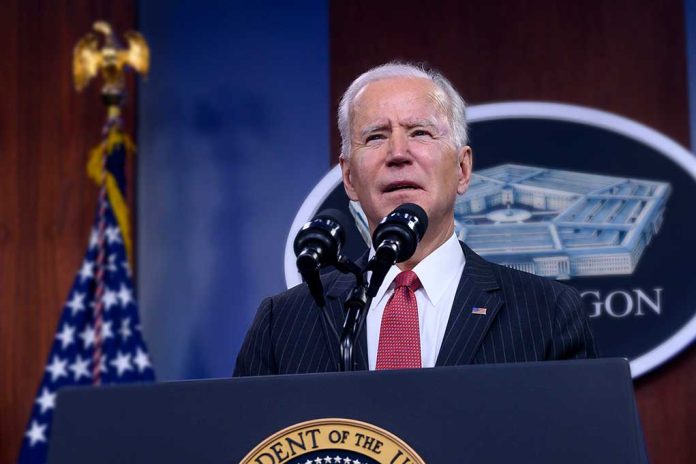
President Biden walks a tightrope as he navigates U.S. support for Israel while attempting to prevent further escalation in the Middle East.
At a Glance
- Biden optimistic about preventing full-scale war between Israel and Iran
- U.S. deploys THAAD missile defense system and 100 troops to Israel
- Administration secures assurances from Israel not to target Iranian nuclear or oil sites
- Concerns persist over potential Israeli retaliation and regional escalation
- U.S. warns Israel to increase humanitarian aid to Gaza or risk losing weapons funding
Biden’s Diplomatic Balancing Act
President Joe Biden finds himself in a precarious position as he attempts to support Israel while simultaneously working to prevent a wider conflict in the Middle East. Following Iran’s missile attacks on Israeli targets, the Biden administration has been actively engaged in diplomatic efforts to cool tensions and avoid further escalation.
Biden recently met with leaders from Germany, France, and the UK in Berlin to discuss the ongoing Middle East conflict. The President expressed cautious optimism about the situation, stating, “There’s an opportunity in my view – and my colleagues agree – that we can probably deal with Israel and Iran in a way that ends the conflict for a while. In other words, it stops the back and forth.”
U.S. Military Support and Strategic Positioning
In a show of support for Israel’s security, the United States has deployed a Terminal High Altitude Area Defense (THAAD) battery and approximately 100 soldiers to bolster Israel’s air defenses. This move underscores the Biden administration’s commitment to its long-standing ally while also serving as a strategic positioning to maintain American influence in the region.
“We listen to the opinions of the United States, but we will make our final decisions based on our national interests.” – Netanyahu’s office
Despite this support, the U.S. has also placed conditions on weapons funding tied to humanitarian concerns in Gaza. American officials have warned Israel to increase humanitarian aid to the region or risk losing access to U.S. weapons funding, highlighting the delicate balance the administration is trying to strike between supporting its ally and addressing humanitarian needs.
🔊 Iran Accuses Biden of Supporting Israeli Aggression in U.N. Letter
The Iranian Mission to the United Nations submitted a letter to the U.N. Security Council today, accusing the United States and President Joe Biden of “instigating, inciting, and enabling acts of aggression… pic.twitter.com/wQI2oRuKH9
— Israel News Pulse (@israelnewspulse) October 22, 2024
Preventing Regional Escalation
The Biden administration believes it has secured assurances from Israel not to target Iranian nuclear or oil sites in retaliation for Iran’s missile attacks. This diplomatic achievement aims to prevent a full-scale regional conflict and protect global economic stability. However, U.S. officials caution that these assurances are not guaranteed and could change due to domestic politics in Israel.
“The Pentagon said in a readout of a call from Sunday that Austin reaffirmed U.S. support for Israel’s security but urged it to ensure protections for U.N. peacekeepers in southern Lebanon, shift from military operations to a diplomatic solution and “raised concern for the dire humanitarian situation in Gaza and stressed that steps must be taken soon to address it.”” – The Pentagon
The situation remains tense, with Iran promising a strong response to any Israeli attack. This puts additional pressure on the Biden administration to navigate the complex web of diplomatic and military decisions that directly impact American interests and security in the region.
In letter sent to #UNSC, @Iran_UN accuses Pres. #Biden of making "alarming & provocative" statement Oct 18 during press conf in #Berlin. Biden "disclosed that he possesses knowledge of how and when Israel intends to launch an attack against the Islamic Republic of Iran. This… pic.twitter.com/fhZdb10fWs
— Adla Massoud (@Adlamassoud) October 21, 2024
Domestic Political Implications
The ongoing conflict and Biden’s handling of it have significant domestic political implications. There is a growing divide among Democrats regarding the conflict, affecting political endorsements and potentially impacting the upcoming U.S. presidential election. Biden’s ability to manage this crisis effectively could have far-reaching consequences for his administration and his re-election prospects.
As the situation continues to evolve, the Biden administration faces the challenge of balancing support for allies with regional stability while managing the complex negotiations with multiple international partners. The President’s diplomatic skills will be put to the test as he works to prevent a full-scale regional conflict and protect American interests in this volatile region.
Sources:
- Biden says there’s ‘opportunity’ to end attacks between Iran and Israel
- Israel assures US it won’t strike Iranian nuclear or oil sites, US officials say
- Iran Tells UN: Biden Has Signaled US Approval, Support for Attack on Iran



